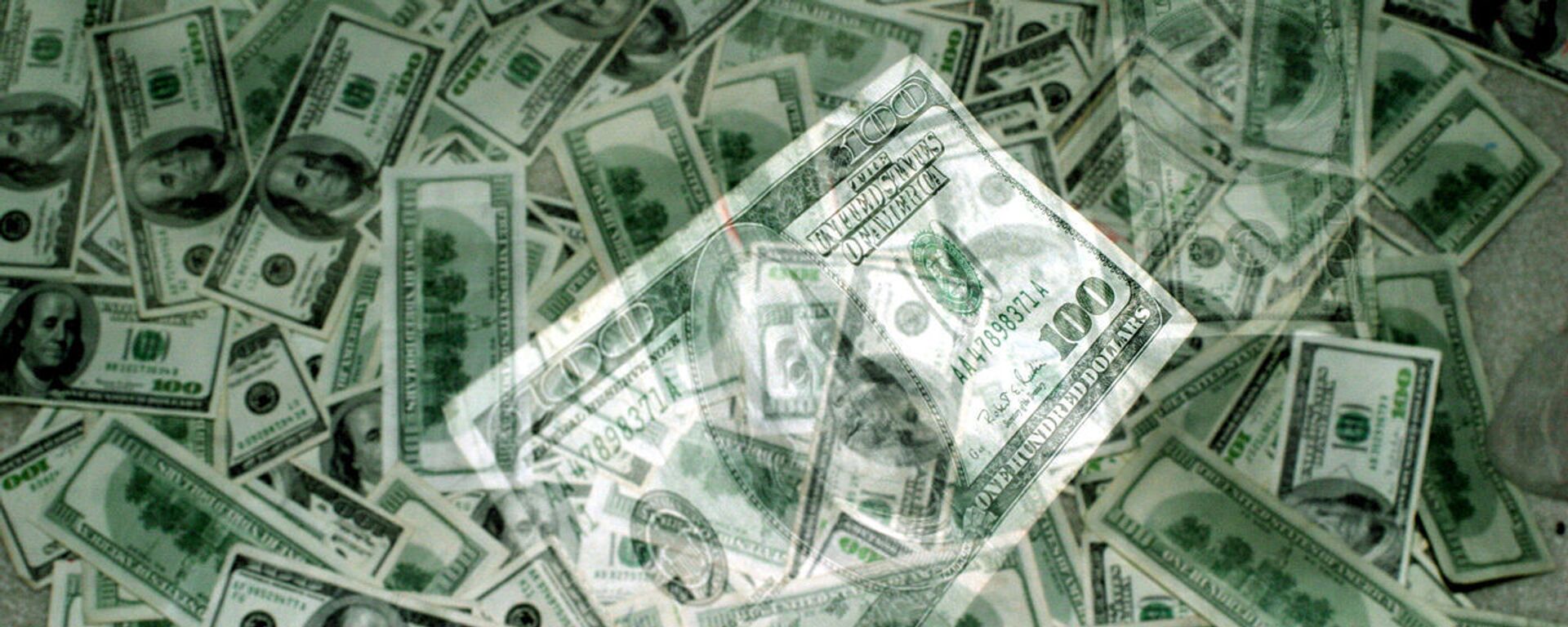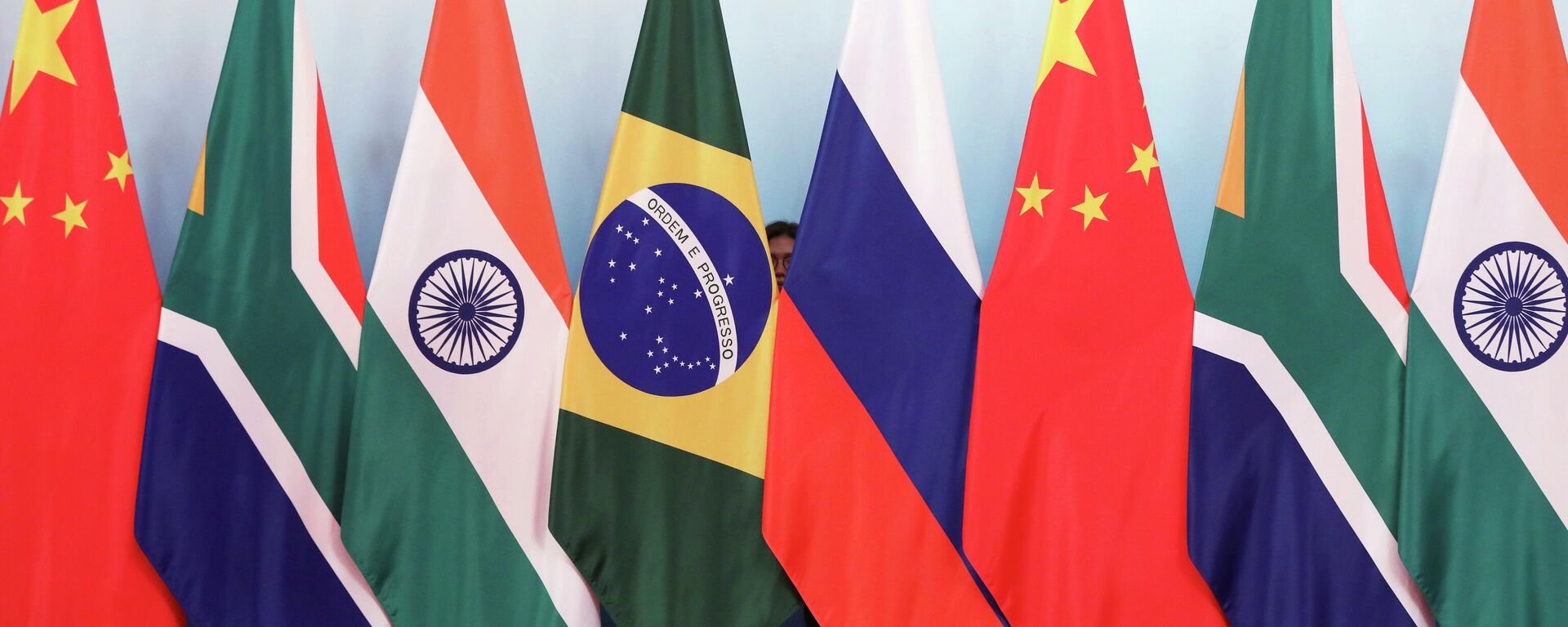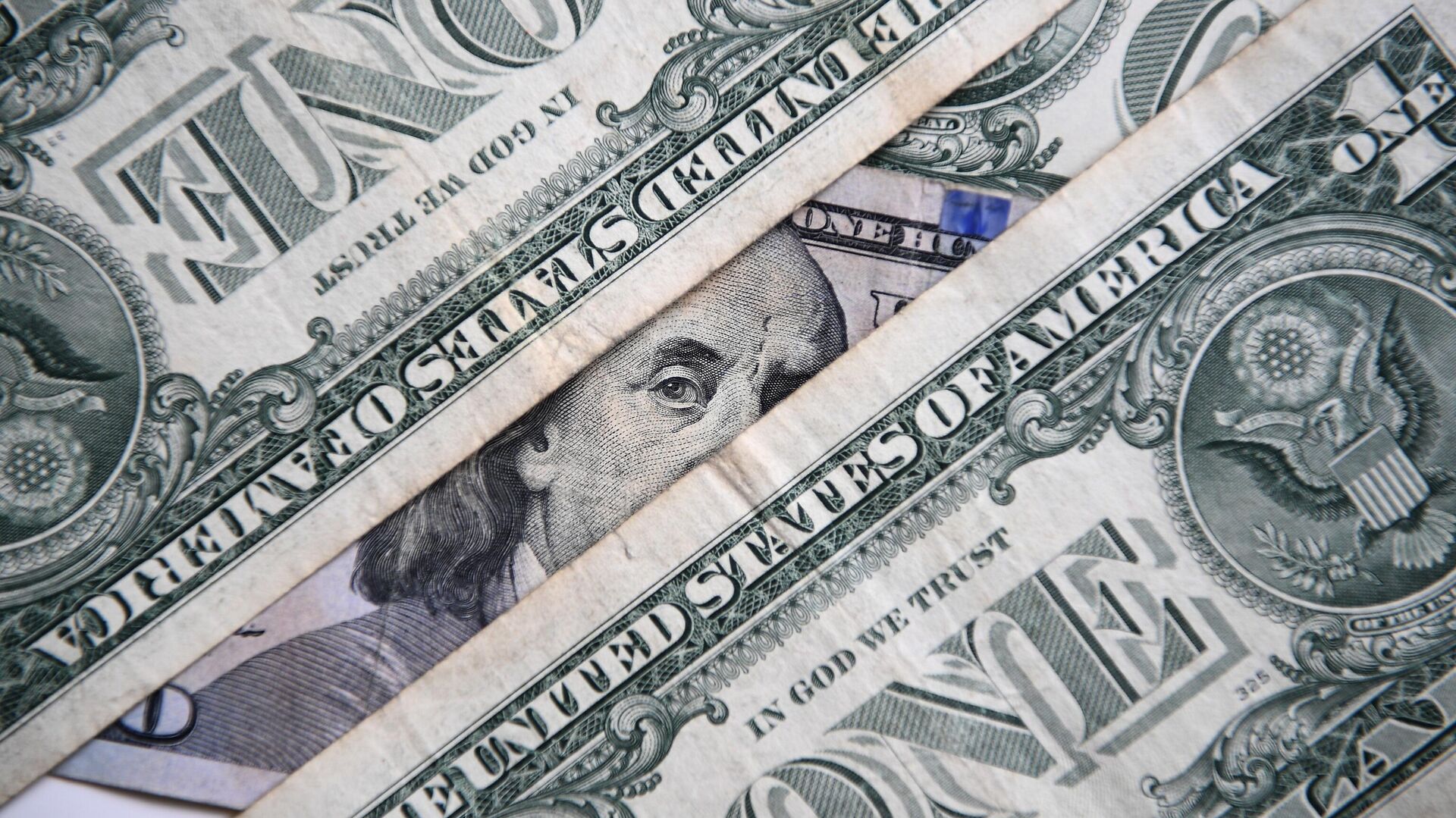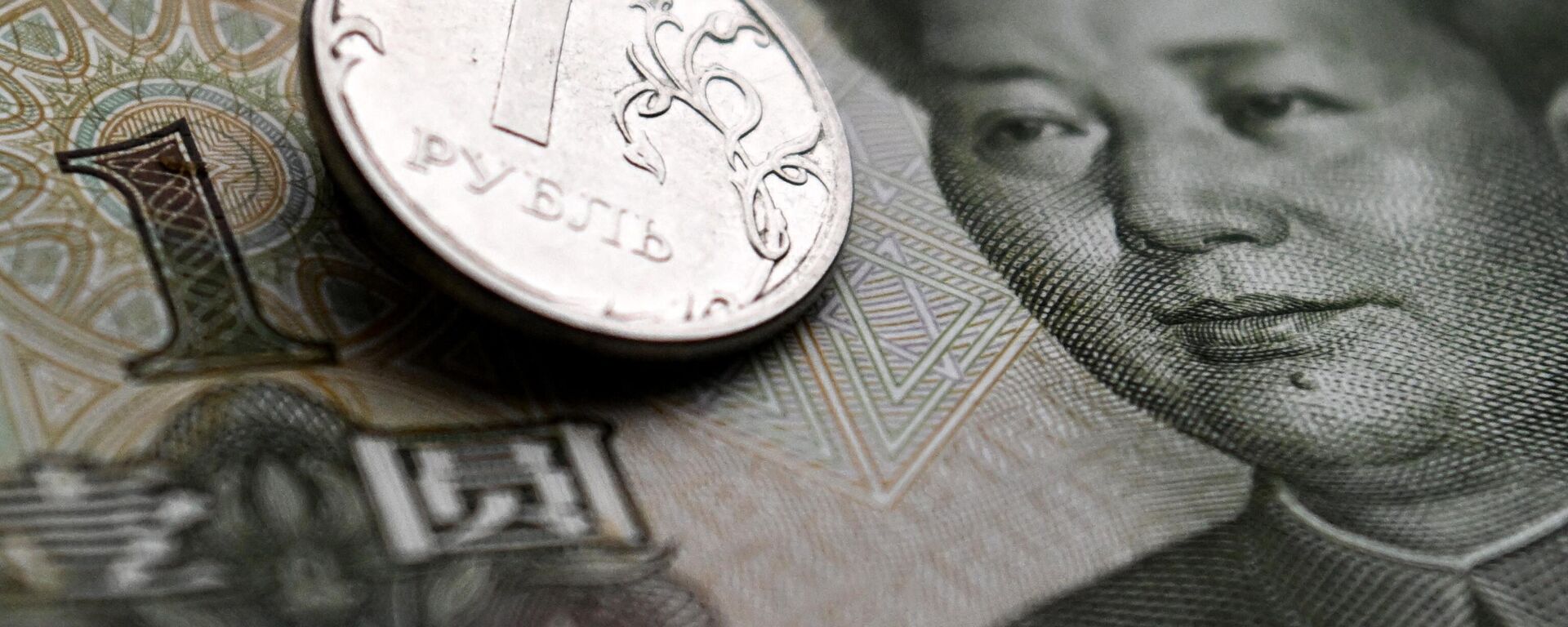https://sputnikglobe.com/20230331/not-by-yuan-alone-whole-set-of-national-currencies-to-deep-six-us-dollar-dominance--1109012015.html
Not By Yuan Alone: Whole Set of National Currencies To Deep-Six US Dollar Dominance
Not By Yuan Alone: Whole Set of National Currencies To Deep-Six US Dollar Dominance
Sputnik International
China's yuan is gaining global momentum as Russia is set to use the currency in settlements with other world economies, while Brazil and China are ditching the... 31.03.2023, Sputnik International
2023-03-31T18:09+0000
2023-03-31T18:09+0000
2023-04-01T09:28+0000
analysis
us
opinion
china
yuan
dollar
russia
europe
petrodollar
oil
https://cdn1.img.sputnikglobe.com/img/07e6/08/0f/1099623349_0:161:3071:1888_1920x0_80_0_0_a52b2252236220ed82364d4ace1f254a.jpg
"This trend greatly affects the US dollar['s] hegemony negatively, in both foreign trade and financial market transactions, since an increasing share of them is not denominated in US dollars but in other currencies, notably in yuan," Sergio Rossi, professor of macroeconomics and monetary economics at the University of Fribourg, Switzerland, told Sputnik. "This weakens the US position with respect to global financial activities, as well as in regard to the influence of US economic policy decisions – particularly the US Federal Reserve’s monetary policy stance – across the global economy."Steady Erosion of Dollar DominanceAccording to the International Monetary Fund (IMF), the share of US-dollar-denominated foreign exchange reserves stood at 59.8%, as of Q3 2022, down from 72% in 1999. International players are continuing to switch from the greenback to other currencies for their reserves, overseas trade, and banking services.For instance, Moscow not only adopted the yuan – also referred to as renminbi – as a reserve currency, but also pledged to use the Chinese means of payment "between Russia and countries of Asia, Africa, and Latin America." China and Brazil have struck an agreement to carry out trade and financial transactions directly, exchanging yuan for reals.The yuan also appears to be ready to dethrone the petrodollar: last year, Beijing called on Gulf leaders to settle their gas and oil deals with China in yuan. The US and China remain the world's top two consumers of crude, using 18.7 million and 15.4 million barrels per day, respectively. Energy settlements in yuan are likely to deal a heavy blow to the greenback.Moreover, earlier this week, China's national energy giant CNOOC and France's TotalEnergies completed their first yuan-settled liquefied natural gas (LNG) deal through the Shanghai Petroleum and Natural Gas Exchange. Likewise, the PRC earlier agreed to pay for Russian energy commodities in rubles and Chinese currency.According to Rossi, there are a couple of good reasons for the yuan's rise. First, China is becoming a major player in the global economy. Hence, an increasing share of foreign trade is denominated in yuan, particularly with regard to Chinese exports or commercial transactions involving countries that have some trade agreements with China, the expert noted.Second, "Western sanctions that recently have banned Russia from US dollar-denominated payments traffic, seizing Russian US dollar deposits across Western countries, have been inducing an increasing number of stakeholders to enter into yuan-denominated transactions, thus replacing the US dollar with the yuan," Rossi pointed out.According to the professor, the West's sweeping sanctions against Russia became a wake-up call for a number of governments who are "aware of the problems for their national economy that result from the dollar dominance, notably as regards financial stability, the financing of governments’ deficits and economic development."The de-dollarization push "is related to the United States and to some extent the European Union using their currencies and the US dollar as a trade weapon to punish countries who are not following what the United States wants them to do," echoed Chris Devonshire-Ellis, chairman of Dezan Shira & Associates, who has a thirty-year investment and business career in China, Russia and Asia.Why Yuan is Unlikely to 'Replace' DollarStill, it does not mean that the yuan is going to replace the dollar, according to Chris Devonshire-Ellis. There are obvious advantages in using not just the yuan, but other countries' currencies, according to him.To illustrate his point, Devonshire-Ellis cited the recent Brazil-China agreement to use both of their currencies in bilateral trade. "That trade is worth about $163 billion a year, so it's quite significant," he remarked."Now, the advantages for using the renminbi and the real in this instance are that those transactions just go between China and Brazil - there's no need to dollarize them," the investor explained. "There are new digital financial mechanisms that allow them to do this. They help to bypass the SWIFT Banking network, the need for US dollars, the need to have US secondary banks as an intermediary and all the related charges. If trade between two countries does not involve the United States, there is simply no reason to use the United States as an intermediary."Indeed, the trend of cutting the dependence on the dollar and switching to national means of payment in international settlements is gaining steam. India and Tanzania have recently concluded a deal enabling them to use their respective currencies in bilateral trade.The Association of Southeast Asian Nations (ASEAN) has gone even further by seeking to reduce dependence not only on the greenback but also on euros, yens, and British pounds in financial transactions. On March 28, the bloc's finance ministers and central bank governors held a meeting in Indonesia to discuss how to move to settlements in local currencies by further enhancing an ASEAN cross-border digital payment system. Initially, the agreement on such transactions was reached between Indonesia, Malaysia, Singapore, the Philippines, and Thailand in November 2022.Speaking to Sputnik in January 2023, Russian economist and researcher Mikhail Khazin projected that the dollar's dominance will be brought to an end by the emergence of several alternative currency zones, comprising the Latin American, Eurasian, Chinese, and Indian regions. According to the economist, the process is already underway. Khazin also believes that "it now makes sense to create a payment system that combines the currency systems of the Eurasian, Chinese, Indian and Latin American zones.""It is necessary to create a payment system independent of the dollar," the economist insisted.What Does the Future Have in Store for Dollars?And what will happen to the dollar then? In the short term, nothing threatens the dollar's reserve currency status, according to Devonshire-Ellis: "Only 25% of the United States GDP is international trade, the rest of it is domestic US wealth," he said. "I don't think that will have a significant impact on the US dollar usage."Still, questions will be asked on how the US dollar is valued, the investor pointed out.One should bear in mind that the US won't give up its dominant position without a fight, according to Rossi. He expects that Washington will launch a central bank digital currency denominated in US dollars, which could be either a wholesale or a retail digital currency issued by the US Federal Reserve.Nonetheless, the problem is that the United States has abused its position leading to a significant erosion of trust in the US and now as a result, the American dollar's role as the global reserve currency is being challenged and rolled back, Devonshire-Ellis concluded.
https://sputnikglobe.com/20230330/china-brazil-strike-blow-against-dollar-through-bilateral-trade-1108959507.html
https://sputnikglobe.com/20230324/kenya-to-buy-oil-for-local-currency-instead-of-us-dollars-1108756344.html
https://sputnikglobe.com/20230323/yuan-settlements-to-curtail-wests-influence-boost-russia-africa-trade-expert-predicts-1108713827.html
https://sputnikglobe.com/20230128/new-currency-zones-taking-shape-within-brics-as-global-dollar-system-crumbling-economist-says-1106787680.html
https://sputnikglobe.com/20230125/lavrov-brics-mulling-own-currency-1106693342.html
china
russia
Sputnik International
feedback@sputniknews.com
+74956456601
MIA „Rosiya Segodnya“
2023
News
en_EN
Sputnik International
feedback@sputniknews.com
+74956456601
MIA „Rosiya Segodnya“
Sputnik International
feedback@sputniknews.com
+74956456601
MIA „Rosiya Segodnya“
us dollar, settlements in yuan, internationalization of the renminbi, yuan as reserve currency, cutting dependence on us dollar, trade in yuans, trade in national currencies, swift, brics, alternative payment systems, digital dollar, digital yuan, anti-russia sanctions, new currency zones, multi polar currency world
us dollar, settlements in yuan, internationalization of the renminbi, yuan as reserve currency, cutting dependence on us dollar, trade in yuans, trade in national currencies, swift, brics, alternative payment systems, digital dollar, digital yuan, anti-russia sanctions, new currency zones, multi polar currency world
Not By Yuan Alone: Whole Set of National Currencies To Deep-Six US Dollar Dominance
18:09 GMT 31.03.2023 (Updated: 09:28 GMT 01.04.2023) China's yuan is gaining global momentum as Russia is set to use the currency in settlements with other world economies, while Brazil and China are ditching the dollar in bilateral trade. What does the trend spell for the greenback's dominance?
"This trend greatly affects the US dollar['s] hegemony negatively, in both foreign trade and financial market transactions, since an increasing share of them is not denominated in US dollars but in other currencies, notably in yuan," Sergio Rossi, professor of macroeconomics and monetary economics at the University of Fribourg, Switzerland, told Sputnik. "This weakens the US position with respect to global financial activities, as well as in regard to the influence of US economic policy decisions – particularly the US Federal Reserve’s monetary policy stance – across the global economy."
"Asian countries, and in part also African countries, depend less on the US dollar than was the case in the recent past. The US economy is, therefore, in a much weaker position than used to be the case with regard to the US public deficit and the possibility to finance it through the purchase of US government bonds by foreign countries’ financial institutions – such as the People’s Bank of China. The US is thereby losing its ‘soft power’ across the global economy and financial markets, as it is clear that the world is becoming multipolar, which rebalances this ‘soft power’ with, among other things, some sort of a multicurrency international monetary regime," Rossi continued.
Steady Erosion of Dollar Dominance
According to the International Monetary Fund (IMF), the share of US-dollar-denominated foreign exchange reserves stood at 59.8%, as of Q3 2022, down from 72% in 1999. International players are continuing to switch from the greenback to other currencies for their reserves, overseas trade, and banking services.
For instance, Moscow not only adopted the yuan – also referred to as renminbi – as a reserve currency, but also pledged to use the Chinese means of payment "between Russia and countries of Asia, Africa, and Latin America." China and Brazil have struck an agreement to carry out trade and financial transactions directly, exchanging yuan for reals.
The yuan also appears to be ready to dethrone the petrodollar: last year, Beijing called on Gulf leaders to settle their gas and oil deals with China in yuan. The US and China remain the world's top two consumers of crude, using 18.7 million and 15.4 million barrels per day, respectively. Energy settlements in yuan are likely to deal a heavy blow to the greenback.
Moreover, earlier this week, China's national energy giant CNOOC and France's TotalEnergies completed their first yuan-settled liquefied natural gas (LNG) deal through the Shanghai Petroleum and Natural Gas Exchange. Likewise, the PRC earlier agreed to pay for Russian energy commodities in rubles and Chinese currency.
According to Rossi, there are a couple of good reasons for the yuan's rise. First, China is becoming a major player in the global economy. Hence, an increasing share of foreign trade is denominated in yuan, particularly with regard to Chinese exports or commercial transactions involving countries that have some trade agreements with China, the expert noted.
Second, "Western sanctions that recently have banned Russia from US dollar-denominated payments traffic, seizing Russian US dollar deposits across Western countries, have been inducing an increasing number of stakeholders to enter into yuan-denominated transactions, thus replacing the US dollar with the yuan," Rossi pointed out.
According to the professor, the West's sweeping sanctions against Russia became a wake-up call for a number of governments who are "aware of the problems for their national economy that result from the dollar dominance, notably as regards financial stability, the financing of governments’ deficits and economic development."
The de-dollarization push "is related to the United States and to some extent the European Union using their currencies and the US dollar as a trade weapon to punish countries who are not following what the United States wants them to do," echoed Chris Devonshire-Ellis, chairman of Dezan Shira & Associates, who has a thirty-year investment and business career in China, Russia and Asia.
"The weaponization of the US dollar against specific targeted currencies and governments [that] the United States doesn't agree with has been going on for some time," Devonshire-Ellis told Sputnik. "In the last 12 months this has intensified, especially regarding the situation with Russia (…) It's notable that the decision to freeze assets was not held in any international court of arbitration, it was imposed by the United States government. Now, when the United States behaves in this way, it makes other countries on a global basis wary of using the US dollar as a base currency."

28 January 2023, 13:38 GMT
Why Yuan is Unlikely to 'Replace' Dollar
Still, it does not mean that the yuan is going to replace the dollar, according to Chris Devonshire-Ellis. There are obvious advantages in using not just the yuan, but other countries' currencies, according to him.
"In terms of the prospects of the yuan becoming a global reserve currency, I think that it'll be a basket of currencies that come to that status," he said. "This is something that the BRICS finance ministers have been discussing. It will be not just the Chinese renminbi, but also the Indian rupee, the Russian ruble, the Brazilian real and the South African rand as well."
To illustrate his point, Devonshire-Ellis cited the recent Brazil-China agreement to use both of their currencies in bilateral trade. "That trade is worth about $163 billion a year, so it's quite significant," he remarked.
"Now, the advantages for using the renminbi and the real in this instance are that those transactions just go between China and Brazil - there's no need to dollarize them," the investor explained. "There are new digital financial mechanisms that allow them to do this. They help to bypass the SWIFT Banking network, the need for US dollars, the need to have US secondary banks as an intermediary and all the related charges. If trade between two countries does not involve the United States, there is simply no reason to use the United States as an intermediary."
Indeed, the trend of cutting the dependence on the dollar and switching to national means of payment in international settlements is gaining steam. India and Tanzania have recently concluded a deal enabling them to use their respective currencies in bilateral trade.
The Association of Southeast Asian Nations (ASEAN) has gone even further by seeking to reduce dependence not only on the greenback but also on euros, yens, and British pounds in financial transactions. On March 28, the bloc's finance ministers and central bank governors held a meeting in Indonesia to discuss how to move to settlements in local currencies by further enhancing an ASEAN cross-border digital payment system. Initially, the agreement on such transactions was reached between Indonesia, Malaysia, Singapore, the Philippines, and Thailand in November 2022.
Speaking to Sputnik in January 2023, Russian economist and researcher Mikhail Khazin projected that
the dollar's dominance will be brought to an end by the emergence of several alternative currency zones, comprising the Latin American, Eurasian, Chinese, and Indian regions. According to the economist, the process is already underway. Khazin also believes that "it now makes sense to create a payment system that combines the currency systems of the Eurasian, Chinese, Indian and Latin American zones."
"It is necessary to create a payment system independent of the dollar," the economist insisted.

25 January 2023, 14:51 GMT
What Does the Future Have in Store for Dollars?
And what will happen to the dollar then? In the short term, nothing threatens the dollar's reserve currency status, according to Devonshire-Ellis: "Only 25% of the United States GDP is international trade, the rest of it is domestic US wealth," he said. "I don't think that will have a significant impact on the US dollar usage."
Still, questions will be asked on how the US dollar is valued, the investor pointed out.
"The US dollar is a debt based currency," Devonshire-Ellis explained. "If you look at the debt of the United States, it's significantly higher than its annual GDP. It is going to lead to problems in terms of how you value the US dollar when faced with a debt larger than our own production. That is going to spur arguments around the US dollar value (…) The US owes a lot of countries a lot of money, the viability and the sustainability of that is going to be called into increasing question."
One should bear in mind that the US won't give up its dominant position without a fight, according to Rossi. He expects that Washington will launch a central bank digital currency denominated in US dollars, which could be either a wholesale or a retail digital currency issued by the US Federal Reserve.
"In the former case, only financial institutions – be they in the United States or elsewhere – could access the digital US dollar," the expert said. "In the latter case, by contrast, all categories of stakeholders might use such a digital dollar for their own transactions in the global economy, thereby exacerbating the currency war that the US administration has been carrying out since the Bretton Woods agreements in July 1944."
Nonetheless, the problem is that the United States has abused its position leading to a significant erosion of trust in the US and now as a result, the American dollar's role as the global reserve currency is being challenged and rolled back, Devonshire-Ellis concluded.









